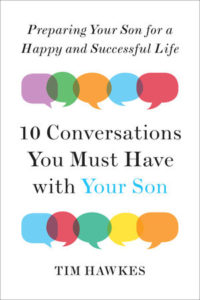Guest Blog Post: Ten Conversations You Must Have with Your Son by Tim Hawkes (Book Excerpt)
 CONVERSATION SIX: ACHIEVEMENT
CONVERSATION SIX: ACHIEVEMENT
Most boys want to achieve and be successful. Poor things. They often don’t realise that success can be a bugger. Not long ago, my school had one of those stellar sets of Year 12 exam results that caused me to consider hanging up my mortar board and gown and start zigzagging golf balls down a fairway. Impetus for retirement was added when a fellow headmaster mournfully said, ‘You’re stuffed now, Hawkes. The governors will want those results every year.’ As I said, success can be problematic, and our sons might need to be reminded of this in their quest for fame and fortune.
It has been suggested that to be successful as a teacher you need to be able to drink three cups of coffee before 8 a.m. and keep it in your system until after 5 p.m. To be successful as a teenage boy is rather more demanding. It requires the following:
- The body of a Greek god (usually male).
- The sporting ability of an Olympian (preferably without steroids).
- The mind of Einstein (but without the hair).
- The sex appeal of Leonardo DiCaprio.
- The social charm of Casanova.
- The wealth of the average banker before the Global Financial Crisis.
All this can be a touch daunting for the average boy struggling with C grades, uncoordinated limbs, a mumbled conversation limited to football and a propensity to blush in the company of a girl. He might also be struggling with acne and a Facebook page devoid of any female friend who could be remotely considered genuine. Heaping coals on the head of the average youth is the implicit expectation that they should do at least as well as their parents, and probably better. I distinctly remember as a teen being in awe of the fact that my parents had learned to drive a car, got reasonable jobs and saved enough moolah to secure a modest home. Furthermore, their dinner conversation was made up of the relaxed banter of those who had read well, travelled a bit and knew a thing or two about contemporary literature. How had they done it? I was flat out learning the road rules for my L plates, holding down a part-time gardening job and buying myself the latest Hendrix offering. And I knew sweet nothing about foie gras. Evidently, it’s not a form of artificial grass.
A boy can be overwhelmed by the task of growing up. Comfort is not provided by schools that hold ‘The Future is Unlimited’ sorts of mottos (usually in Latin). Neither do schools help when they wheel in a steady procession of inspirational speakers who have all sorted themselves out and become famous. As a boy in 4B (the bottom grade), I found it all rather depressing. School prizes won in my early teens were limited to a dictionary given at Speech Night. I think it was for effort. Some parents offer little comfort to their son. Several have quite unrealistic expectations, and this problem can be made worse by a parent who is professionally successful. Being expected to climb the same pinnacle of success can be particularly frightening for a son, and even more so if he suffers vertigo. Some boys do not cope well with living on the top of a mountain. It can get cold and windy up there.
Parents must be careful not to visit upon their son their own neuroses. More than one father has tried to assuage his failure on the football field by screaming advice at his son from the sidelines.
More than one mother has tried to deal with the demons of career disappointment by hounding a son to improve his school grades.
Sons can be quite different from their parents. They must be allowed to be different and to find success in their own way. While on this topic, it is worth noting that a son can be quite different from another son – and, even more significantly, from a daughter. Mars is not Venus.
I’ve only ever done it once. It was while I was teaching at a boarding school. Like many farmers, these parents were generous of heart. They had popped in to the housemaster’s flat with some pickled this and preserved that. It was a heartfelt gift, given that their son was a difficult child. As the conversation moved from the weather (could do with a few points of rain), to their son (could do with a few better grades), I sought to reassure them. ‘Look, he may not be strong academically, but he is quite good at …’
I could not think of a single thing the boy was good at, and stood there umm-ing and ah-ing when, to my infinite relief, both parents laughed. As I said, he was a difficult child.
In nearly 40 years of teaching, this has happened only once. Normally, I am able to find some virtue in a boy. Even in the most challenging of students, there is usually some redeeming quality.
Back in 1983, the educationalist Howard Gardner wrote a book titled Frames of Mind. It is a book that has had a huge impact on schools. It now deserves to have a huge impact on homes. Gardner argues that we are too consumed with IQ (general intelligence). We see a low IQ reading as indicating low all-round ability. Gardner suggests that this is not true, because there are many ways a person can be intelligent. A son’s intelligence can focus on the following areas:
- Maths, reasoning and logic.
- Spatial tasks such as map reading and visualization.
- Language, in both spoken and written form.
- Sport, dance and coordination.
- Interpersonal skills, such as being able to relate well to others.
- Intrapersonal skills, such as having a good understanding of oneself.
- The natural world, in being able to understand plants, animals and the physical geography of a place.
- Spiritual and religious matters.
 Okay – a son may not be topping his class in English, but he may be outstanding in sport and in looking after animals, even the cat. Success can come in many forms.
Okay – a son may not be topping his class in English, but he may be outstanding in sport and in looking after animals, even the cat. Success can come in many forms.
Excerpted from Ten Conversations You Must Have With Your Son by Tim Hawkes with the permission of TarcherPerigee, an imprint of Penguin Random House. Copyright © 2016 by Tim Hawkes.
TIM HAWKES is the author of several books including Boy Oh Boy: How To Raise And Educate a Sonand the Learning Leadership series. He has taught in England and Australia for over 35 years and been a headmaster for much of that time. A highly regarded educational resource, author and social commentator, Tim Hawkes is in demand as a conference speaker around the world. A resident of Australia, he is married and has three adult children, including a son.
Tags: famliy life, fatherhood, later motherhood, parenting a boy, raising a son, ten conversations you must have with your son, tim hawkes















